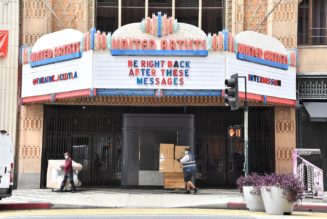
How a sneakerhead site created a secondary market for some of music’s biggest stars — and how they can deal themselves in
When The Weeknd’s fourth album, After Hours, debuted at No. 1 on the Billboard 200 in March, merchandise was at the heart of the biggest first sales week of 2020 to date. Over half of the total 444,000 album equivalent units — 275,000 — were album sales, according to Nielsen Music/MRC Data, spurred on by merch and ticket bundles, with The Weeknd packaging After Hours with more than 80 items. Fans could buy the album alongside everything from hoodies, T-shirts and face masks to flasks, playing cards and ash trays, most available for just 24 hours.
But for those who failed to act before that 24-hour window slammed shut, within a day many of the items were available for sale on secondary merch and apparel reseller StockX, a platform that allows users to bid on streetwear and accessories to create a sort of stock market appraisal for items that are rare or hard to find. In The Weeknd’s case, some After Hours merch items reached two and three times their list price.
StockX was founded in 2016 primarily as a marketplace for shoe collectors known as sneakerheads, offering to verify the authenticity of hard-to-find, pristine-condition kicks that were bought and sold on the platform. But in the past three years, it has started a rapidly growing trade in artist merchandise, with products from over 20 performers, labels and artist collectives verified for resale and more than 800 individual pieces available from acts including Travis Scott, Kanye West, Beyoncé, Lil Wayne, Kid Cudi and The Rolling Stones.
“We believe we’re building the next-generation commerce platform for the next generation of consumers,” says Scott Cutler, who took over as CEO in 2019 after holding executive roles at StubHub, eBay and the New York Stock Exchange — perhaps uncoincidentally, the three businesses from which StockX takes much of its ethos. “Our platform represents the currency of culture, and now that artists are releasing products, we really see an opportunity to capture that for our users.”
“The way I look at it is becoming the StubHub for artist merch,” says StockX head of streetwear Scotty Newman. “StubHub created a safe, secure way to be able to buy and sell tickets on the aftermarket. I think that’s the same concept that I’m looking at for artist merch.”
The “limited edition” approach adopted in recent years by artists such as West, Scott and The Weeknd — taking after streetwear brands like Supreme, BAPE and Jordan with small-quantity drops and one-off capsule collaborations available only during specific time frames or at pop-up locations — has propelled artist merch to the second-biggest streetwear category in terms of gross sales on the platform. It’s now behind only Supreme and ahead of names such as Kith, BAPE, Off-White and Fear of God, up 200% year over year in sales with a share of the market three times larger than it had in mid-2019 — and Scott, the undisputed kingpin of artist merch on StockX, is the No. 2 brand behind Supreme, with all five of the top-selling items on the site. The fervor for pieces like Scott’s Astroworld I Love NY crewneck (with a high bid of $900) or his Astroworld black hat (going for $220, 775% more than its retail price) led to streetwear brands eyeing artist merch for their business model, which involves limited-availability presales — putting up a shirt for a 48-hour window, say, before taking it down forever — rather than the enforced scarcity (releasing just 100 shirts in a collaboration, for example) that has fueled the streetwear and sneaker marketplaces for years.
Here’s how StockX works: Kid A goes to the West show in Miami and buys a piece of tour merch, or logs onto Scott’s web store to make a purchase from his capsule collection before a 48-hour window closes. Kid B lives too far from the show, or missed the online sales window, but wants to own some limited-edition merch from his favorite artist, so Kid B goes to StockX to lodge a bid. Kid A ships his merch to a StockX authentication center — there are six around the world — where the item is verified as legitimate and unused and then sent on to Kid B, completing the transaction. StockX says it only lists what it can verify, thus tightly controlling its offerings and promising fans that what they buy is legit.
“What’s fueling the growth? The transformation of artist brands into commodified, traceable and sellable merchandise,” says StockX senior economist Jesse Einhorn. “I think artists have realized that they can put out T-shirts and hoodies and apparel and merchandise just like a brand would and garner the same type of loyalty from customers.”
The rise of the music artist as a streetwear brand has helped propel StockX to its biggest growth period to date. In July, the company announced it had passed 10 million sales on the platform — up 50% over the past year — totaling more than $2.5 billion, with May and June the biggest buyer months in its history even as the pandemic cut sharply into retail sales worldwide. A $110 million round of funding in June 2019 valued the company at $1 billion, and investors include Eminem, Scooter Braun, Steve Aoki and Mark Wahlberg.
Unsurprisingly, StockX has seen a boost in what could be called pandemic-related products: Puzzle sales are up 582% since lockdowns began in March, and masks are up 282%. In the month of August, the site’s top-selling streetwear item is a Scott Cactus Jack face mask, which sold for $25 at Scott’s web store — and $40 at StockX.
Artist merch in general tends to gain value over time on the platform: 85% of the top 100 items in the past year have grown in value at an average of 47% per item ($55). The highest-priced pieces of merch are from the West-Cudi collaboration Kids See Ghosts — the price of its FREEEE Hoodie Core climbed as high as $2,204, the most expensive piece of artist merch on the site, while a FREEEE Crewneck Sweatshirt Ghost ($1,347) appreciated 240% from its price in January. On average, Kids See Ghosts items sell for $388 — much more than the next-highest-priced artist merch. (The late Pop Smoke, at No. 2, has an average sale price of $252.)
Artists don’t participate in revenue from resales on the market unless they are the sellers themselves — StockX’s marketplace is anonymous, with its verification process negating the need for sellers to build up trust. In other words, artists like Scott and West could easily be selling their own merch directly on the site without buyers having any idea. That’s where comparisons to StubHub — which has angered managers, musicians and promoters with its resale market that can inflate the price of tickets, cutting out regular fans while providing zero revenue to the artist — begin. While tickets to live events are limited by the venue size itself, some major artists are known for routinely limiting production of certain items — to the chagrin of their merch partners — in order to increase demand, resell the items themselves and then reap the scarcity-boosted profits on the secondary market, sources say.
Jesse Lawrence, founder/CEO of TicketIQ, a secondary ticket service, says that while the variable pricing of the secondary market angers fans in the world of ticketing, it’s actually an effective marketing tool for merch. “Ticketing is so emotional; people get really angry about artists having prices too high, so it’s a tightrope for artists in providing access versus maximizing revenue,” says Lawrence. But in merch, “the higher your price, the more perceived demand there is, and that’s always a good thing for a brand. It just creates more demand for the next one, and buzz — if you’ve got the most expensive shoe, that’s definitely a marketing hook.”
In the past year StockX has introduced two new programs — IPO, or initial product offering, which establishes a mini-market to assess demand for a new item before it goes on sale; and DropX, which allows artists and brands to set retail prices before items go on sale — to enable artists and brands to partner with StockX and sell directly on the marketplace and participate in profits. “There’s no retail price or typical 40% margin like there would be at retail,” says StockX vp consumer marketing Tom Woodger, referencing a New Balance IPO earlier in 2020 for which a shoe the company would normally list at just above $100 debuted on the market at $415. “So there’s massive financial upside for whoever we’re working with to launch that product.”
In August, J Balvin and Funko Pop! Rocks became the first to use DropX to release an exclusive Balvin figurine, limiting supply to 500 units. Originally listed at $41, the price has climbed as high as $79, with an average sale price of $50 on the platform (an 18% increase on the listed price). The DropX with Balvin — who does not have merch available for resale on the site — represents a way for artists to directly profit off the platform, and was the first of several StockX projects with musicians in the works, including another exclusive IPO release with Chinese pop star Jackson Wang on Sept. 8.
Balvin’s manager Fabio Acosta — a devoted sneakerhead who discovered StockX while digging for kicks — describes the site as similar to a high-end boutique. “The people that are looking for items on StockX know that they’re going to pay extra because maybe it’s exclusive or hard to find,” he says. “I think the right way to work with them is to have exclusive pieces that you can sell just through them. The artist can keep selling his regular merch through his website, on tour or through the channels they normally do. But through StockX you can put exclusive pieces with better quality.”
Programs like DropX and IPO signal the company’s desire to expand beyond the domestic sneaker market, using apparel, accessories and collectibles to flex its muscles internationally and build enough business to add verification centers in new territories beyond London and the Netherlands. Artist merch is a big part of that growth plan.
StockX may have built a billion-dollar business around sneakers, but music is now a company “pillar,” according to Woodger, alongside fashion and sports. He says the company will grow its platform for artists. “Whether that’s an artist coming to us and saying they want to get something to market, or whether it’s us being able to work with an artist in order to create things to put in front of our audience,” says Woodger, “you’ll only see more of that as we go on.”










